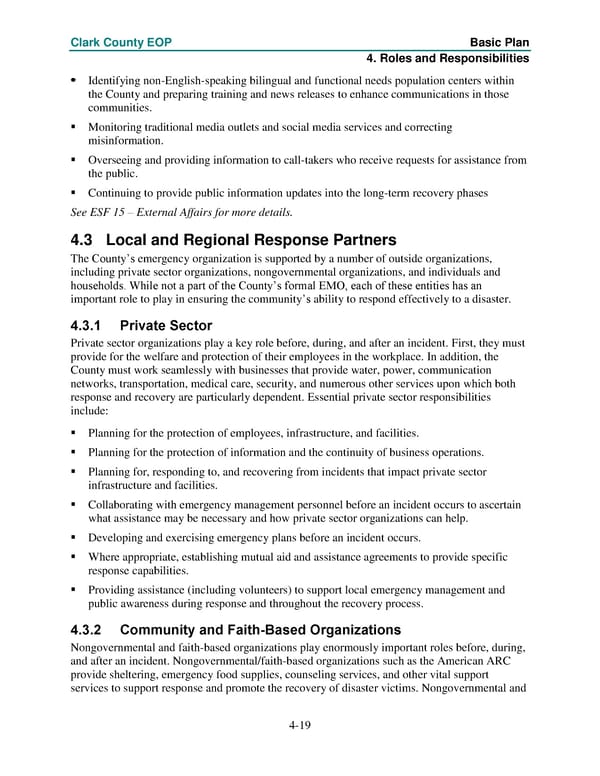Clark County EOP Basic Plan 4. Roles and Responsibilities Identifying non-English-speaking bilingual and functional needs population centers within the County and preparing training and news releases to enhance communications in those communities. Monitoring traditional media outlets and social media services and correcting misinformation. Overseeing and providing information to call-takers who receive requests for assistance from the public. Continuing to provide public information updates into the long-term recovery phases See ESF 15 – External Affairs for more details. 4.3 Local and Regional Response Partners The County’s emergency organization is supported by a number of outside organizations, including private sector organizations, nongovernmental organizations, and individuals and households. While not a part of the County’s formal EMO, each of these entities has an important role to play in ensuring the community’s ability to respond effectively to a disaster. 4.3.1 Private Sector Private sector organizations play a key role before, during, and after an incident. First, they must provide for the welfare and protection of their employees in the workplace. In addition, the County must work seamlessly with businesses that provide water, power, communication networks, transportation, medical care, security, and numerous other services upon which both response and recovery are particularly dependent. Essential private sector responsibilities include: Planning for the protection of employees, infrastructure, and facilities. Planning for the protection of information and the continuity of business operations. Planning for, responding to, and recovering from incidents that impact private sector infrastructure and facilities. Collaborating with emergency management personnel before an incident occurs to ascertain what assistance may be necessary and how private sector organizations can help. Developing and exercising emergency plans before an incident occurs. Where appropriate, establishing mutual aid and assistance agreements to provide specific response capabilities. Providing assistance (including volunteers) to support local emergency management and public awareness during response and throughout the recovery process. 4.3.2 Community and Faith-Based Organizations Nongovernmental and faith-based organizations play enormously important roles before, during, and after an incident. Nongovernmental/faith-based organizations such as the American ARC provide sheltering, emergency food supplies, counseling services, and other vital support services to support response and promote the recovery of disaster victims. Nongovernmental and 4-19
 Emergency Operations Plan Page 77 Page 79
Emergency Operations Plan Page 77 Page 79